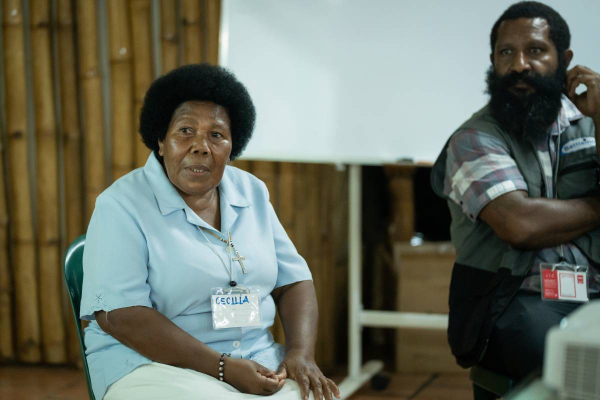Let Go: A Call to Repentance

We are born to grasp.
From the womb, one of our most basic instincts is to curve inward, fingers curled into fists and knees pulled up over tender bellies. When my babies were born I was surprised at how tightly their little hands could grip my finger. It was like they were unaware that they were securely cradled in my arms.
We arrive in the world focusing only on our own needs — and entirely unable to meet them. No amount of crying and grasping can provide the warmth, nourishment and physical care we require to survive. We have to rely on someone else.
As we grow it’s difficult to unfurl our minds and emotions from their natural inward curve. Self-focus continues to be our most comfortable posture.
We’re not made to live our lives in a fetal position; we’re not meant to remain the center of our own existence. God longs to unbend our backs, set us on our feet and lift our chins so we can function in the way we were created.
Several years ago, my friend told her preschool daughter, “The world doesn’t revolve around you.” Her little girl propped her hands on her tiny hips and snapped, “Well then who does it revolve around?”
Many of us, whether we admit it or not, often have that same attitude. An uncomfortable, fundamental reshaping of our hearts forces us to see beyond ourselves to the truth that life isn’t all about us.
This reshaping is what God wants for us. He calls his children out of the wild grasping and into the confidence of knowing we’re cradled securely in his arms.
A Relationship Built on Reality
For many, the word “repent” carries ugly connotations — angry men waving signs and yelling about a bully God who wants to destroy people. But real repentance is beautiful — invited by God’s sacrificial, rescuing love rather than driven by his vindictive anger.
Much of the misunderstanding of repentance comes from confusion surrounding the concept of fearing the Lord. When I was younger I struggled to reconcile what I knew of God’s love and kindness with his desire for his children to fear him. How can a relationship with God and fear of him coexist?
Psalm 2:11 says that we are to “serve the Lord with reverent fear, and rejoice with trembling” (NLT). Another psalm links his kindness toward us with our fear of him: “The Lord is like a father to his children, tender and compassionate to those who fear him” (Psalm 103:13, NLT).
Meanwhile, Revelation 15:4 presents this future image of worldwide worship: “Who will not fear you, Lord, and glorify your name? For you alone are holy. All nations will come and worship before you, for your righteous deeds have been revealed” (NLT).
What does it mean to truly fear the Lord? It doesn’t mean that we cower because he wants to intimidate us into obedience or has malicious intent. Fearing the Lord simply means acknowledging that he is so far outside of our understanding.
Any true glimpse of who God is will leave us sobered and stunned. He is vast, and nothing about him fits the confines of the human mind. Even Jesus’ closest friends were stunned when he calmed a raging storm with just words: “The disciples were absolutely terrified. ‘Who is this man?’ they asked each other. ‘Even the wind and waves obey him!’” (Mark 4:41, NLT)
Any view of God that doesn’t cause us to “rejoice with trembling” isn’t based on the truth of who he is. We can’t build a relationship with God on any foundation other than the knowledge that he is God and we are not.
He will always know best — even when we aren’t comfortable with the boundaries he sets.

No Shadow of Shame
The idea and discussion of sin may not be popular, but if we believe Scripture, we must acknowledge its existence. 1 John 1:8 states this clearly: “If we claim we have no sin, we are only fooling ourselves and not living in the truth” (NLT). When we live like we know how to meet our own needs better than our Creator does, we ultimately make a mess of ourselves and those around us.
God hates sin and its destructive impact on his children, and he asks us to let it go and turn away from it because he knows we won’t be free if we cling to things that ultimately don’t satisfy. And he knows letting go is something we can’t do on our own.
That’s why we need Jesus.
Colossians 1:13-14 celebrates the liberty we have because of Jesus: “For he has rescued us from the kingdom of darkness and transferred us into the Kingdom of his dear Son, who purchased our freedom and forgave our sins” (NLT). Repentance isn’t just letting go of lesser things so God can give us greater gifts — it’s letting go of chains because God’s Son has bought our freedom!
Jesus has made it possible for us to release our grip on our own hollow desires, calm our frantic grasping for things we think will soothe our aches and relax into the protective arms of our Father. When we know we are held in God’s strong embrace, our hearts can safely uncurl, no longer bound by self-protective impulses.
It isn’t comfortable to examine our own failures or admit that we’ve messed up. We don’t like to be wrong; we often tie our self-worth to what others think of us, assuming that we’ll lose love and admiration if we allow our broken areas to show. Shame can hold us captive, preventing us from admitting our faults.
But hiding in shame is the opposite of God’s desire for his children. He wants our freedom from sin and the shame it carries, and he offers it with a simple invitation: “But if we confess our sins to him, he is faithful and just to forgive us our sins and to cleanse us from all wickedness” (1 John 1:9, NLT). Forgiveness and cleansing are not just possible — they are promised. As soon we admit our sin and release it to God, we no longer carry its weight.
Knowing we’re God’s beloved children removes the shame from repentance. Psalm 34:5 asserts this truth: “Those who look to him for help will be radiant with joy; no shadow of shame will darken their faces” (NLT). We can come to him for help over and over, with confidence and radiant joy. What an astonishing gift we’re given — this daily freedom to let go, repent and be made new.
And what beauty we find in this place of release, where God trades our self-focused, counterfeit treasures for the kind of spiritual riches that truly satisfy.
Pause and Let Go
As you think about God’s invitation to come to him in repentance, consider these questions:
What feelings do you associate with the word “repent”?
What does fearing the Lord look like in your life?
Identify an area where you still struggle with living mentally and emotionally curled inward, trying to meet your needs on your own. What specific thought patterns or behaviors might God be asking you to let go of?
How might God be inviting you out of shame and into repentance?
Discover how you can partner with communities around the world who are still waiting for the hope of Scripture in their language.






